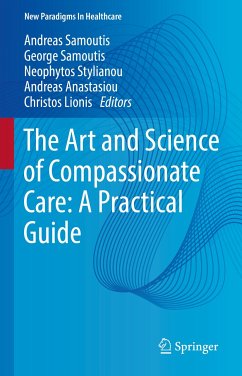This book draws on clinical experience, educational activities and evidence-based knowledge from academic physicians (primary, secondary and tertiary care), nurses, psychologists, health economists, healthcare managers, health policymakers, medical professionals students and patients. It provides skills and knowledge that can be implemented in daily clinical practice based on all levels of healthcare on a whole-person approach. An array of clinical cases, patient journeys, published evidence and practical experience is combined to deliver in a practical way unique guidance and advice. The target audience is all healthcare professionals, health policymakers, healthcare managers and patient associations. This approach of Compassionate Care is of great importance and can save lives and money in these unprecedented times of global healthcare care system challenges.
Dieser Download kann aus rechtlichen Gründen nur mit Rechnungsadresse in A, B, BG, CY, CZ, D, DK, EW, E, FIN, F, GR, HR, H, IRL, I, LT, L, LR, M, NL, PL, P, R, S, SLO, SK ausgeliefert werden.









